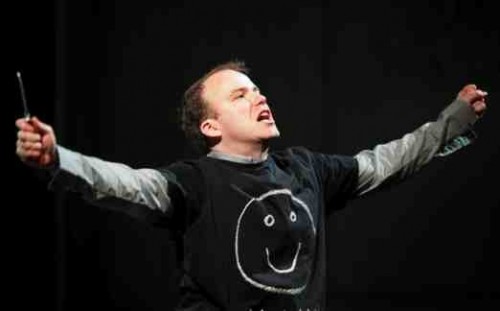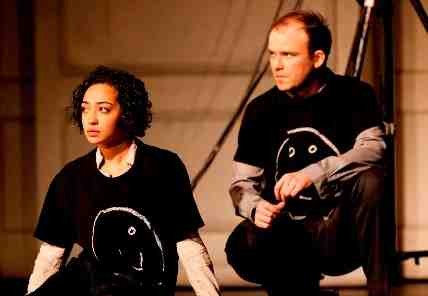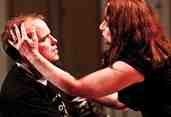NYU Skirball Performing Arts Center: Hamlet
The National Theater Live in HD
By: Susan Hall - Dec 14, 2010
Hamlet by the National Theater
Skirball Performing Arts Center at NYU
Rory Kinnear, Hamlet
This is the second year Skirball Performing Arts Center at NYU has brought the British National Theater Live to local venues across the world.
Having watched Live from Lincoln Center develop, driven by the argument that the risk of live performance could be delivered via television and make staged productions exciting on TV, I have watched the 'live trainsmission' concept expand. The original idea of risk came because affordability was an issue, and minimal camera work and minimal rehearsal made production relatively inexpensive. Now minimal camera work means less intrusion on the production, allowing the performance to be front and foremost. Everyone has a good seat and at more than reasonable price, $20-25, compared to $200 on Broadway and almost $400 at the Metropolitan Opera.
It is still very difficult to sort out the economics of these transmissions, but having looked closely at the Metropolitan Operas Live HD broadcasts, we know that union payments, future distribution as DVDs, the participation of major talent are all part of the cost, whether or not it goes into the live transmission side of the ledger. The Met keeps the video transmission truck parked on Amsterdam, guarded by staff, instead of sending it back and forth between broadcasts. It’s cheaper to pay for the truck and the cables installed once, than to pay unions to connect and reconnect cables.
Obviously for NYU, who would not comment on the financial aspects of National Theater Live, whatever arrangements they make to receive the transmission, they benefit greatly from drawing a lower Manhattan audience, often (and an often-stated mission) bringing young people in to great performances. The Clark Museum in Williamstown shows the Met HDs and soon other Berkshire venues will broadcast events like the National Theatre.
Interesting that many of us, and I certainly am in this group, like to sit in a darkened theater surrounded by others, and laugh and cry and applaud together. Live streaming to home does not completely satisfy.
Rory Kinnear is a revelation in this Hamlet. Performing just a mile from the theater where the play premiered four hundred years ago, Kinnear is completely present and makes Hamlet a vibrant, understandable Prince. He is an ordinary man, a loner trying to work out a battle plan under instructions from his father's ghost.
This is in part a play about what we can learn from plays. As soon as the travelling players arrive, Kinnear comes to. His voice is richer, his movements more alarming. His state is a mix of aggressive, manic laughter, intense unhappiness and confusion. He can't make sense of anything. In the end there is no sense. Dying, he asks Horatio to tell his story, and three times Horatio tries, without success. It is a story that can't be told. It is pure puzzlement. Now all of Shakespeare's words fall into place.
Whether Kinnear's face is made patent in all its detail through the camera or you could get these subtle and not so subtle facial expressions live in a house I can’t determine. Suffice it to say that the actor's manipulation of his eyebrow (s), a curled lip on one side only, a kind a confused scrunch of the lips to nose to brow, I could go on and on, make us see and then feel how confused and unhappy Hamlet is in a unique and compelling way.
Before the performance began, the director Nicholas Hytner talked about this Hamlet. It is his first and he was waiting for the modern actor to interpret the role. He is right to have seen him in Kinnear, a not well-known acting son of a famous comic actor.
Hytner interestingly discusses the Elizabethan penchant for knowing and investigating everything about everyone’s life. Paranoia, as Mort Sahl once said, had no meaning, because you really were being spied on everywhere. Hytner's Denmark is a surveillance state.
The production is pervaded by this sense of eerie intrusion, and Hamlet’s personal sense that his father has been murdered grows out of the mood of this staging. It is an idea that works brilliantly to explain the sweet Prince.
David Calder’s excellent Polonius is not the bumbling fool we sometimes see, but the spymaster general. With an imperceptible nod of the head he sends three agents at a time off to do his bidding. When he tells one to keep an eye on his son Laertes in Paris, it is not the worried, doting father, but rather the spy-in-chief who needs to know everything.
In this world where everything is surveyed, Patrick Malahide’s cold, unremorseful and unrepentant Claudius is utterly convincing as a man who would kill his brother, usurp the crown, and run a state with a mixture of paranoia, steely control, mistrust and snooping. His henchmen are everywhere Ruth Negga’s feisty Ophelia, after she goes mad, is trailed by two government agents, making one wonder, again for the first time, whether her drowning was her decision.
In a supporting cast Clare Higgins’s Gertrude is revelatory. Higgins is no weak, lovestruck, pliable and guilt-ridden mother and wife. Instead she is a self-assured woman, more than capable of barking out orders herself and knows exactly what she wants out of life. In the confrontation scene with Hamlet, where often she is played as a frightened wreck, this Gertrude raises her hand to clout her impertinent son.
Only sound is a problem. I asked the sound engineers at the Skirball what kinds of controls they had. They were fed only one line. This means that the sound of all the voices is uniform, often approaching a shrill top, and surely not the way the lines are being delivered on stage. In the Met broadcasts, sound also remains an issue. We are not in the opera house. As technology addresses these problems, we may come closer to subtleties of live sound production. So much is conveyed by the visuals that complaints seem like carping.
The Skirball was filled with an audience of all ages. Coming out of the subway after the performance, the two young men who scampered up the steps ahead of me were talking. “I can’t wait to see Derek Jacobi as Lear.” That’s the next Shakespeare at Skirball, and other lucky venues throughout the US. Tanglewood is probably not far behind in broadcasting live to the world. Not a moment too soon.




